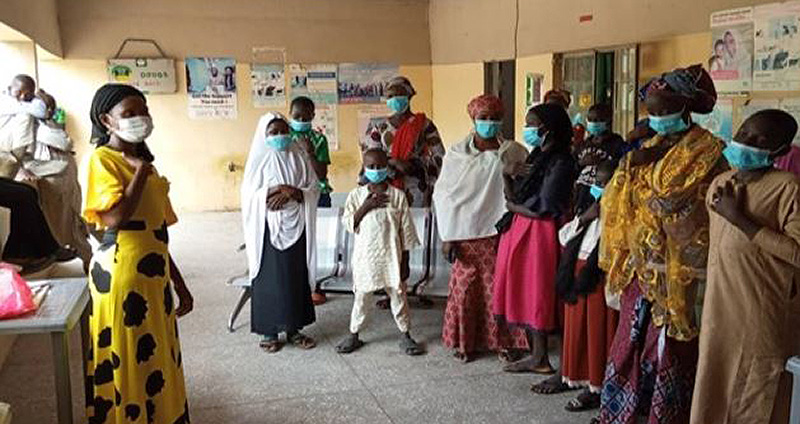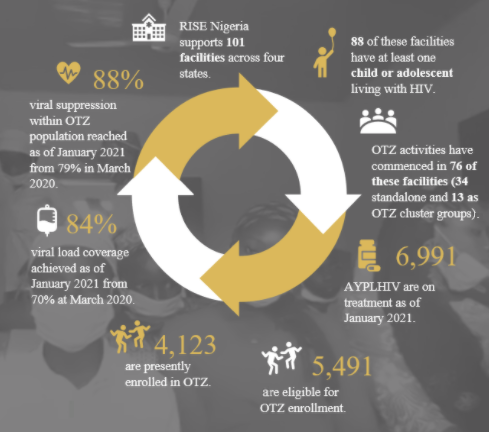The adolescent stage of life is often associated with physical and emotional stresses, which can be even more challenging for adolescents living with HIV.
Adolescents (ages 10–19) and young persons (ages 15–24) living with HIV (AYPLHIV) often have to contend with the fear and stigma associated with their diagnosis, often without adequate support from their parents or community. “When I was diagnosed with HIV, I thought my world had come to an end,” said Catherine, a 20-year-old living in Adamawa state. “I thought to kill myself but couldn’t.”
Anxious and depressed, Catherine found a lifeline in Operation Triple Zero (OTZ), a youth-focused health initiative supported by the Reaching Impact, Saturation, and Epidemic Control (RISE) project in Nigeria, which is led by Jhpiego in partnership with ICAP at Columbia University.
To support its commitment to achieving the UNAIDS 95-95-95 goals, RISE Nigeria introduced the OTZ approach to reach AYPLHIV with a package of care. The package includes youth-friendly HIV services, connectedness, positive living messages, caregiver education on supportive parenting and strategies to improve health by targeting zero missed appointments, zero missed medications and zero viral load for adolescents and young persons — the triple zero. OTZ provides a platform for young people living with HIV to interact with peers facing similar challenges, which has helped to relieve anxiety and uncertainty among enrollees.
“OTZ has been a blessing. Now I am comfortable socializing with people. It has taught me to take my drugs regularly to stay healthy,” said Catherine.
AYPLHIV are among the most vulnerable yet underserved populations in the HIV continuum of care. State and national surveys in Nigeria show high disease burden and unmet need for HIV services among adolescents and youth, making them a key focus group for effective HIV programming in the journey to HIV epidemic control. OTZ helps to ensure that AYPLHIV have the tools they need to live long, healthy lives while also building community.

With support from the U.S. President’s Emergency Plan for AIDS Relief through the U.S. Agency for International Development, RISE works in multiple countries, including Nigeria, to promote optimized HIV testing, treatment initiation for clients who test positive for HIV and viral suppression for clients on antiretroviral therapy (ART). In Nigeria, RISE provides HIV testing, care and treatment services in Akwa Ibom, Adamawa, Cross River and Niger states in close partnership with the Ministry of Health. The project has rolled out the OTZ approach in geographically defined adolescent clubs that are located in 34 standalone ART sites and 13 clusters for ART clinics with too few adolescents to form a standalone club. Consequently, adolescents in 76 of the 88 (86%) RISE-supported facilities with at least one adolescent enrolled have access to a functional OTZ club.
OTZ offers comprehensive youth-friendly HIV services, a treatment literacy package, motivational messaging and counseling, and peer-to-peer support and mentorship. Facility support staff and OTZ champions (adolescent peers) motivate and support adolescents and youth living with HIV to become active stakeholders and partners in their health. The program prioritizes timely antiretroviral refills and encourages viral load sample collection during OTZ club meetings to support continuity in care.
RISE also upgraded adolescent-friendly centers with recreational equipment to attract adolescents while providing HIV counseling, testing, care and treatment services. According to 19-year-old OTZ club member Ibrahim of Adamawa, “OTZ recreation has given me books and now I can read better. This helps me so I can take my medications as prescribed.”
The OTZ program has led to an increase in the number of adolescents who are comfortable disclosing their HIV status, and who successfully enroll in and continue ART care. Among the 456 youth on treatment who are registered in the OTZ program in Adamawa state (representing 75% of adolescents and youth eligible for OTZ in the state), viral suppression has increased from 86% in March 2020 to 91% as of December 2020.

Beyond the focus on adolescents and youth, OTZ offers an opportunity for caregivers and parents of its participants to meet separately during OTZ meetings, offering support to one another. Caregivers are supported in providing age-appropriate disclosure and adherence support.
RISE Nigeria connected HIV-positive youth across the four RISE-supported states in a virtual solidarity event to commemorate World AIDS Day in 2020. Participants Zoomed in to sing, laugh and share their experiences and feelings, which ranged from hopelessness after learning their diagnosis to more positive attitudes, self-esteem and relationships they have discovered since enrolling in the OTZ program.
Iliya, an OTZ club member in Adamawa state, said, “I used to isolate myself. But OTZ has helped to build my confidence. I now have friends and I take my drugs regularly.”
In Adamawa, RISE continues to support its OTZ champions to ensure the program’s success while expanding to enroll more young people living with HIV. RISE Nigeria remains committed to OTZ programming, driving adherence to treatment and achieving viral suppression among youth—both critical to realizing the goal of an AIDS-free generation.
Onyeka Nwosu is the RISE Program Officer, Adamawa state; Maaji Abubakar serves as Strategic Information Assistant, Adamawa state – RISE; and Samuel Orisayomi is Clinical Officer, Adamawa state – RISE. Editor Joan Taylor also contributed to this article.




